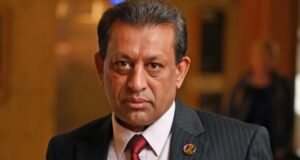
The deputy leader of the Labour group on Tower Hamlets council in east London has resigned from the party after Sir Keir Starmer made reference to Bangladesh when answering a question about the deportation of illegal migrants.
In a statement posted on X, Councillor Sabina Akhtar said: “I can not be proud of the party any more when the leader of the party singles out my community and insults my Bangladeshi identity.”
Answering questions from an audience of Sun readers on Monday, the Labour leader said: “At the moment people coming from countries like Bangladesh are not being removed.”
Sir Keir had been asked what Labour was going to do to deport people who arrived in the UK illegally.
During a campaign visit to Staffordshire on Thursday, he said he “certainly wasn’t intending to cause any concern or offence” to British Bangladeshis who were “making such an enormous contribution to our country”.
All he had been saying, Sir Keir added, was that as far as asylum seeker returns were concerned, Bangladesh was a safe country and one that had a returns agreement with the UK.
If Labour won the election, he wanted to “build on the very strong relationship” the party already had with the Bangladeshi community in Britain, he said.
In a video clip circulating on social media, seen by the BBC, Sir Keir’s comments in Monday’s Q&A session have been edited and taken out of context.
At the end of the clip, the video encourages viewers to “vote for independent candidates”. It is not clear who put it together.
Labour has described the clip as “misinformation”.
But a party candidate in the general election – in Bethnal Green and Stepney, which is in Tower Hamlets – said there had been concern.
Rushanara Ali, the first British Bangladeshi to be elected to the Commons and MP for Bethnal Green and Bow until Parliament was dissolved last month, said: “There has been considerable concern and upset following the release of a clip of the Labour Party Leader.”
She added that she had been “in close contact with his team to relay the concerns in our community”.
She would “always work hard to ensure the interests and concerns of the British Bangladeshi community are at the heart of policy in a future Labour government”, Ms Ali said.
During the Sun event, Sir Keir said the number of people returned to where they came from had fallen by 44% under the Conservative government.
He pledged to “put the staff back in the returns unit” in “the first few days” of a Labour government.
“I’ll make sure that we’ve got planes going off – not to Rwanda, that’s an expensive gimmick – they will go back to the countries where people come from. That’s what used to happen,” he added.
Pressed by the event host, Sun political editor Harry Cole, on which countries he was talking about, Sir Keir responded: “At the moment people coming from countries like Bangladesh are not being removed, because they’re not being processed.”
In May, the government signed an agreement with Bangladesh “to speed up the removal of migrants with no right to be in the country”.
In 2023, according to Home Office statistics, 12 failed asylum seekers were deported to Bangladesh, while 66 went back voluntarily.
In a video posted on X, Apsana Begum, Labour’s candidate in Tower Hamlets’ other parliamentary constituency, Poplar and Limehouse, said: “I will never ever stand by and let migrant communities be scapegoated.
“It is totally unacceptable for politicians, for any party, to use dog whistle racism against Bangladeshis or any other migrant community.”
According to the 2021 census, more than a third of Tower Hamlets’ population were of Bangladeshi ethnicity.
A Labour Party spokesperson said Sir Keir had “proudly supported the Bangladeshi community across the UK”.
“This clip has been edited to make it look as though Keir Starmer is suggesting repatriation of British Bangladeshis. It is misinformation.
“In fact, Keir is referring to Labour’s long-established policy of returning those who don’t have the legal right to be in the UK to safe countries.
“Bangladesh was only used as an example, as there is already a bilateral agreement between the two countries.”
 Weekly Bangla Mirror | Bangla Mirror, Bangladeshi news in UK, bangla mirror news
Weekly Bangla Mirror | Bangla Mirror, Bangladeshi news in UK, bangla mirror news







